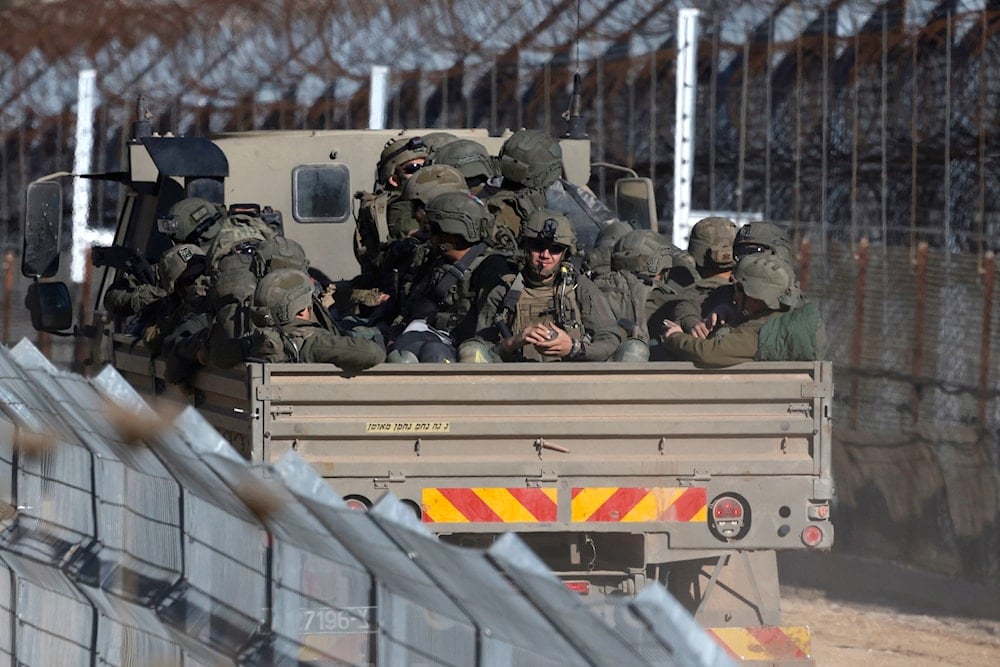Israeli military faces severe manpower crisis, hundreds quitting
Israel Hayom describes the crisis as “particularly severe” now, as the Israeli military plans to expand its ranks to meet the numerous additional responsibilities imposed by the war.
-

An Israeli army vehicle transports soldiers into the UN-patrolled buffer zone in the occupied Golan Heights on December 18, 2024 (AFP)
The Israeli military is facing a manpower crisis, Israeli media reported, revealing that hundreds of officers are quitting the army at the height of the war.
The Israeli military has yet to complete the year 2024, but it can already be said that since the second quarter of the year, particularly in the past six months, approximately 500 majors have voluntarily left the army, indicated the Israeli newspaper Israel Hayom.
The newspaper considered that this is a statistic that "should shake Israel," especially at a time when security challenges are mounting and the military is planning to establish additional combat frameworks.
It added that the Israeli military leadership is surprised by the scale of this phenomenon, admitting they expected the wave of departures to increase after the war, not during it.
The report highlighted that the military began the war already grappling with an acute manpower shortage. In 2022, a record 613 majors left the army in a single year, alongside officers of lower ranks, particularly captains.
While the rate of departures slowed in 2023, particularly toward the end of the year due to the outbreak of the war, the trend has resurfaced, Israel Hayom noted.
The cost of war
In a related context, the Israeli newspaper mentioned that projections for 2025 “are not encouraging,” explaining that the reasons behind the crisis among permanent service soldiers are numerous and not solely tied to the unbearable burden imposed by the war.
The report suggested that the fact many permanent service soldiers have barely seen their homes or families over the past year due to the ongoing war has left an impact.
It also pointed out that unlike reservists, who receive public support, grants, and significant financial assistance, permanent service soldiers do not receive the same recognition, public empathy, or benefits.
Unlike permanent service soldiers, reservists receive financial aid, payments for childcare services, and home assistance for their spouses, Israel Hayom said.
According to the newspaper, reservists also enjoy breaks from combat, while permanent service soldiers continue at the same grueling intensity, a situation unlikely to change soon given the large-scale demobilization of reservists.
The 'invisible' officers
Additionally, the report highlighted that senior military officers have long acknowledged the problem and are aware that permanent service soldiers feel “invisible” in the eyes of the public.
Meanwhile, Israel Hayom said there is “intense debate" among permanent service soldiers, with many believing the war has only proven that they can serve as reservists without working full-time for relatively low pay.
The newspaper described the crisis as “particularly severe” now, as the Israeli military plans to expand its ranks to meet the numerous additional responsibilities imposed by the war.
A strategic threat
This is an appropriate time to acknowledge that the problem is not confined to captains and majors, the report highlighted, adding that there are also "a considerable number" of unit commanders, including combat officers, who are uncertain about their future paths.
In 2024, only five lieutenant colonels quit the military, and none from the combat units, but according to current trends, the numbers for 2025 could be “alarming”, even among combat units, Israeli Hayom indicated.
The newspaper cautioned that the problem is not limited to the Israeli military, asserting that the manpower crisis constitutes a strategic threat to "Israel" itself, explaining that “if competent permanent service personnel leave the army, there will be no one to fill their positions.”
“Wars are not won with tanks and planes but with the people who operate them,” it concluded.
Read more: Israeli forces estimate 100,000 occupation soldiers disabled by 2030

 4 Min Read
4 Min Read








